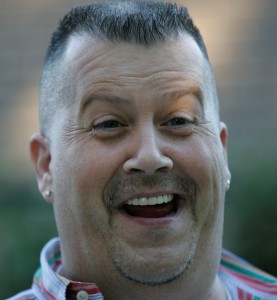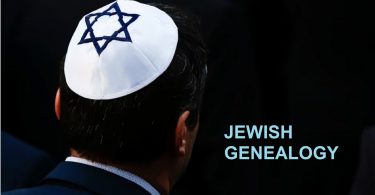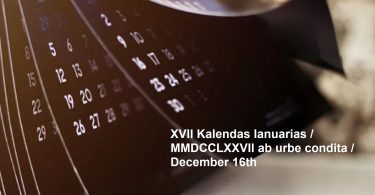Photo courtesy of Thomas MacEntee
This native Up-State New Yorker, who has quite literally taken the art and strategy of genealogy research to the air- and cyber-waves of electronic media, has really made the grade. Thomas MacEntee has achieved an impressive presence on Facebook, Twitter, BlogTalkRadio, and the blogosphere. He also lectures at genealogical societies and conferences throughout the U.S. In early 2012 almost 700 genealogists and family historians were polled by the Canada-based Anglo-Celtic Connections website to select the Top 10 Genealogy Rock Stars. Thomas MacEntee landed in the Top 5, and we are lucky to have him share his insight on how genealogy research is being impacted by new technology.
RC: How important is social media to the world of genealogy? How has it helped? How has it hurt?
TM: I think that the use of social media is very important to the world of genealogy and its impact will continue to grow in the next few years. Social media’s two main benefits to genealogists have been: a) enabling the expansion of the genealogy industry through increased awareness of family history by the general public and b) the ability to connect and collaborate with other genealogists.
RC: In what ways do you think digitization of records is changing the field of genealogy and the genealogist’s role?
TM: Digitization of records is a blessing, but without proper stewardship from the genealogy community, could turn into a curse. Here’s what I mean: as Americans we are used to instant results and instant gratification. Having greater access to online records has helped many of us get access to documents that were heretofore only accessible in person at a repository or by ordering microfilms from a Family Search Center. At the same time, we’re seeing newcomers to the field harboring misconceptions as to online records availability and a sense of being “done” with one’s research if it isn’t online. This is where we need to become stewards for genealogy education and guide newcomers to the realities of research and records access.
RC: If you could choose any database to be digitized next, which would you choose? Do you have any “favorite” digitized databases that maybe our readers don’t know about?
TM: My favorite database right now is the War of 1812 Pension Files which are being digitized at Fold3 and through the financial support of the genealogy community via the Preserve the Pensions project at the Federation of Genealogical Societies. The reason I feel this set is so important is that it helps provide information on our ancestors who aren’t listed by name in the 1790 – 1850 US Census records. And folks need to understand the nature of these pension files! Don’t think that just because you didn’t have a War of 1812 ancestor that you won’t find anything of value in the records. The truth is that the files are filled with witness statements and affidavits, even letters, from relatives and neighbors of the veteran or his widow and children petitioning for a pension.
RC: What are your thoughts on DNA testing? Will it substantially change genealogy and the role of genealogists in the future?
TM: I’m excited about DNA genealogy testing but also worried, more so about the privacy issues related the results (where are they stored, who has access, etc.). I’ve done several tests and I continue to be fascinated by the results. Over the next 10 years, I predict that not only will more genealogists start using DNA testing to prove or disprove research theories, but it will also help bring in new people to the field of family history. I don’t think DNA testing will change the fundamentals of genealogy research; however, it will function as a new tool to provide evidence during the research process.
RC: What is your definition of forensic genealogy, and do you think this field of study will elevate genealogy to a more recognizable and important entity in investigations?
TM: From my perspective, forensic genealogy relates to resolving legal issues such as relationships in a probate case, locating next of kin to claim a body at the county morgue, etc. But in essence, isn’t all genealogy forensic in nature? I think that the field is going through a process of self-definition among its practitioners, and this will, in fact, not only elevate this sub-section of genealogy, but also make the entire field of genealogy more attractive. I’ve always said that genealogy was much like CSI work (and “without the icky bodies’ like the television shows). Just as the criminology field has seen a big jump in younger people interested in this type of work, the forensic aspect of genealogy could do the same for our field.
RC: Your involvement with ReelGenie seems to be a perfect match? Tell us more about the product and where you see it going. You referred to it as “The Genealogy Technology to Watch in 2013.” Can you elaborate on this?
TM: I can only say so much about ReelGenie right now, but I am so excited about this new product that it is difficult sometimes to contain myself. Here is what I can say: one of the growing challenges for family historians is what to do with all the research, the family photos, and the written narratives one has worked on over the years. Wouldn’t it be great to transform these items into a compelling visual piece of media to share with family and friends? Think video, think “do-it-yourself” and think “storytelling.”
RC: You specialize in the use of technology and social media to improve genealogical research. What aspect of genealogy research do you believe can never be replaced by technology? What aspect of ancestry searches could be made better by technology?
TM: Analysis and proof will never be replaced by technology, although tools will make it easier for genealogists to review all the evidence and make suggestions as to the components of the proof argument. We already have some of these: timeline apps and websites let us view an ancestor’s work life or migration patterns easily; the same for mapping programs where we can pin our research points and get a better picture of what happened where and when. But nothing will replace the “noggin” and thankfully so. If technology could do the analysis and proof for us, then wouldn’t it not only take all the fun out of the “hunt,” but also make genealogy less meaningful?
RC: What do you think precipitated the recent interest in family history? Is it because more records are available on the Internet, or something else?
TM: My theory on the increased interest in family history has to do with technology, actually. As we spend more time on the Internet, we become more isolated. We want to connect more with family, friends, and other like-minded individuals. We also want to know more about who we are and where we came from. Combine all that with a greater awareness as to family medical history, and then add the Baby Boomers who have a strong sense of nostalgia and are retiring in greater numbers every day, and BOOM! That’s right . . . a Genealogy Boom!
RC: How important is it to be a Certified Genealogist? Do you think it is necessary to be a CG to be taken seriously in the industry?
TM: I think it is important to be the best possible person in terms of doing what you love. For some of us, that means attaining certain goals and meeting standards whether you are a professional genealogist or not. While I don’t think having a CG or any of the other certifications in the field is mandatory to be a good genealogist, it is something I personally intend to pursue. I don’t believe in doing anything half way. My plans are to work on my CG in 2013 and get “on the clock” very soon. If I succeed it will be a great accomplishment. If I fail, I know I will still have learned a great deal about my skills, my research habits, and about genealogy.
RC: You said that you split your time among three areas: 50% consulting, 30% speaking engagements, 20% freelance writing assignments. Do you still do any genealogy research for clients or for yourself?
TM: I am winding down on doing client research for the time being, but I do a few hours each week on my own projects to hone my skills and, of course, to solve those family mysteries.
RC: What was your favorite genealogical research project? What was your most difficult?
TM: My favorite project lately has been working on my MacEntee line and trying to connect it with the rather famous McEntee family of Ulster County, New York. This might be where DNA testing, as mentioned above, will be needed to solve the issues.
RC: Do you have a favorite ancestor in your genealogy tree, perhaps one that is most like you? If so, who is it and why?
TM: My favorite ancestor is Johannes Putman (1645-1680) who was my 9th great-grandfather. He arrived in Schenectady, New York, from Holland and was killed in the Schenectady Massacre of 1680 along with his wife and 24 others. His children were taken off to Canada and later escaped to return to New York. It was his story that first got me interested in genealogy over 20 years ago.
RC: Have you hit a genealogy brick wall? How did you break through it?
TM: I’ve hit many “brick walls,” but I prefer to call them speed bumps on my genealogy highway. I don’t believe in barriers, and many times we construct our own brick walls through lack of proper research techniques or by not being able to stand back and look at the bigger picture. Also, I’m never afraid to ask for help! I don’t see it as a sign of weakness . . . in fact, often a second set of eyes will lend that perspective I need to make progress in my research.
RC: Since you are a Top 10 Genealogy Rock Star, which iconic performer represents your style?
TM: David Bowie.
RC: Your blog profile says your favorite books are “coloring books.” Do you like to color inside the lines or outside? Does your preference relate to the way you deal with your business? If so, how?
TM: Outside the lines. In fact, I try not to see the lines. I don’t believe in barriers and thankfully I wasn’t raised that way. I come from a long line of ancestors who refused to live within the confines that society dictated for them. When I started my genealogy business, if I had listened to all those who said I couldn’t do what I was trying to do, I would probably have walked away. I see things differently than most people, and I have a different vision about genealogy than most. This doesn’t mean my vision doesn’t intersect and share qualities with the vision of others. I just tend to have a highly-defined vision with a look towards the future. This is why I name my business High-Definition Genealogy.
Don’t forget to visit Thomas MacEntee’s Geneabloggers website, and take in the advice of a couple thousand genealogists and lineage researchers. Put the advice to work for you, but if you hit a genealogy brick wall and need the assistance of a professional genealogist, or you are ready to enter the world of DNA genealogy testing, contact Record Click.







